
|
Astronomy Picture Of the Day (APOD)
 Antarctica Hears Little Matter in the Big Bang
Antarctica Hears Little Matter in the Big Bang
1.05.2001
On the frozen tundra near the bottom of our world, increasingly sophisticated instruments listen for a more precise echo of how our universe started. Sunday, independent collaborations behind three such instruments announced evidence that...
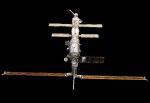 Approaching the International Space Station
Approaching the International Space Station
30.04.2001
Earlier this month the crew of the US Space Shuttle Endeavor took in this view as they approached the developing International Space Station (ISS). The Endeavor and ISS crew installed Italy's Raffaello...
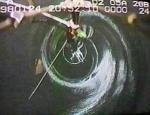 Ice Fishing for Cosmic Neutrinos
Ice Fishing for Cosmic Neutrinos
29.04.2001
Scientists are melting holes in the bottom of the world. In fact, several holes have been melted near the South Pole, and they are now being used as astronomical observatories. Astronomers with the Antarctic Muon and Neutrino Detector Array (AMANDA) lower into each vertical lake a string knotted with basketball-sized light detectors.
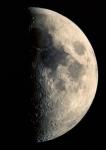 The Moon and All the Crashes
The Moon and All the Crashes
28.04.2001
A clear blue summer sky finally grows dark and the new telescope, hastily set up in the backyard, generates excitment and anticipation. "I bought it for the kids.", Dad assures himself as he anxiously supervises two young boys' efforts to center a bright, first quarter Moon in the finder.
 Visitors Galaxy Gallery
Visitors Galaxy Gallery
27.04.2001
A tantalizing assortment of island universes is assembled here. From top left to bottom right are the lovely but distant galaxies M61, NGC 4449, NGC 4725, NGC 5068, NGC 5247, and NGC 5775/5774. Most are spiral galaxies more or less like our own Milky Way.
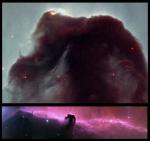 Horsehead Rides Again
Horsehead Rides Again
26.04.2001
Difficult to see in small telescopes, the Horsehead nebula was recently selected by internet voters as a target for the Hubble Space Telescope. Above (top) is Hubble's detailed view of the dark cosmic dust cloud, released to celebrate the 11th anniversary of the workhorse orbiting observatory.
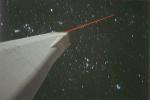 Space Laser Creates Artificial Star
Space Laser Creates Artificial Star
25.04.2001
Some astronomers don't like stars. Bright star fluctuations can indicate how the Earth's atmosphere is changing, but many times no bright star exists in the direction where atmospheric information is needed.
 NGC 2264: Stars, Dust, and Gas
NGC 2264: Stars, Dust, and Gas
24.04.2001
The nebula surrounding bright star S Mon is filled with dark dust and glowing gas. The strange shapes that haunt this star forming region originate from fine interstellar dust reacting in complex ways to the energetic light and hot gas being expelled by the young stars.
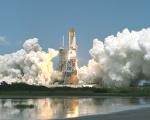 Space Shuttle Lifts Off for Space Station
Space Shuttle Lifts Off for Space Station
23.04.2001
Last Thursday, Space Shuttle Endeavor lifted off on course for the latest round of building the International Space Station (ISS) in orbit around Earth. One of the highlights of the 11-day mission promises to be the installation of Canadarm2, a robotic arm that will assist in the future construction and utilization of the ISS.
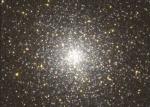 Globular Cluster 47 Tucanae
Globular Cluster 47 Tucanae
22.04.2001
Stars come in bunches. Of the over 200 globular star clusters that orbit the center of our Milky Way Galaxy, 47 Tucanae is the second brightest globular cluster (behind Omega Centauri). Known to some affectionately as 47 Tuc or NGC 104, it is only visible from the Southern Hemisphere.
|
January February March April May June July August September October November December |
|||||||||||||||||||||||||||||||||||||||||||||||||